Essential Care Needs for Happy and Healthy Cockatiels
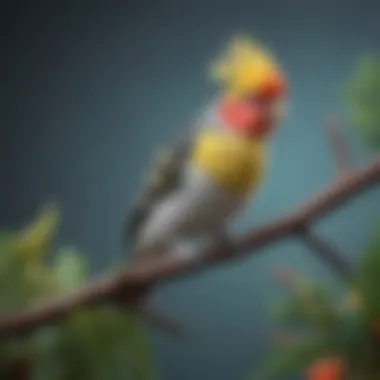
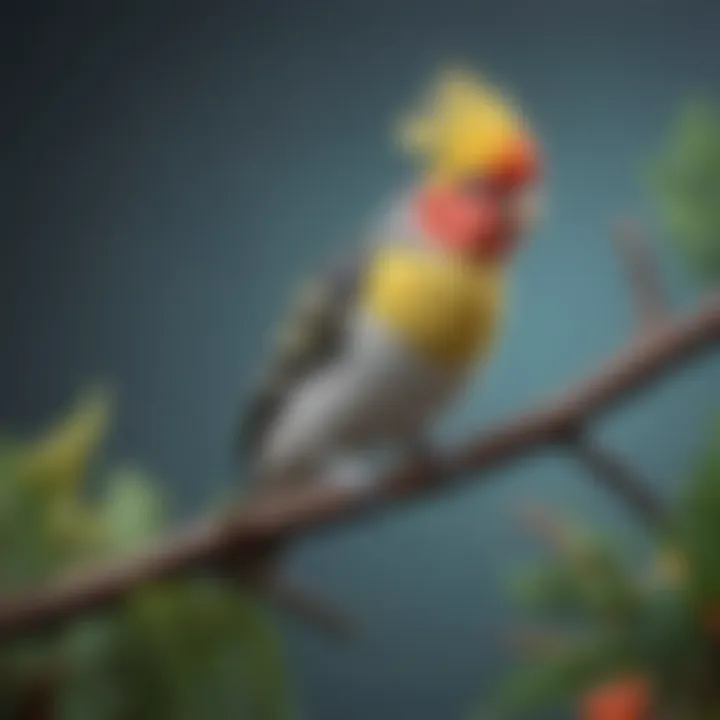
Intro
Cockatiels are a special kind of bird. Popular as companions, they charm many households with their intelligence and sociable nature. However, owning a cockatiel involves knowing how to properly care for these unique creatures. Their happiness and health depend on a variety of factors, including diet, living space, social needs, and mental challenges. A comprehensive approach to their care is essential. Through understanding these aspects, is can be easier for owners to create a nurturing environment which benefits both the birds and their human companions.
Care Tips
Caring for cockatiels goes beyond just providing food and water. Owners need to establish daily routines and maintain an adequate environment.
Daily Care Routines
Start with simple tasks each day. Ensuring fresh water is available is crucial. Include a varied diet that suits their needs. It's important to feed them at regular times to aid their digestion. Observation also plays a large role in care; owners should regularly check on their birds to ensure they are active and alert.
Cage Setup and Maintenance
A cockatiel's cage should provide enough space for movement. Consider the size of the bird itself when choosing a cage. The interior must allow them to stretch their wings and hop around. Additionally, cages need regular cleaning. Dishes should be washed daily, while the cage should be deep-cleaned weekly to prevent staining and odor.
Hygiene and Cleaning Practices
Keep in mind that cockatiels can be prone to infections. Regular grooming insights are needed here. You can trim their nails and provide baths to keep feathers clean. Using a damp cloth can also help clean splatter from the cage accordingly. Proper hygiene can minimize medical issues caused from bacteria.
Seasonal Care Adjustments
Seasons affect cockatiel care considerably. In colder months, ensure the bird’s environment is warm. Drafts must be eliminated. In the summer, hydration is key. Providing plenty of fresh water can counteract the heat effects. ensuring they stay cool is essential during this season.
Behavioral Insights
Cockatiels express emotions and needs through body language. Understanding this is vital. Owners should be aware of their birds’ moods and reactions to different situations.
Understanding Bird Body Language
A cockatiel’s posture, wing position, and vocalizations give hints. For instance, fluffed feathers can indicate coldness or fear. Lowered wings might show calmness or relaxed state.
Common Behavioral Issues and Solutions
Like humans, cockatiels have their quirks. Some might exhibit behaviors such as excessive screeching or feather plucking. Investigate possible causes, including boredom or lack of attention. Address behavioral issues by keeping the bird engaged.
Positive Reinforcement Techniques
Rewarding good behaviors with treats or affectionate sounds reinforces a bird’s positive actions. This method is simple yet effective in shaping how they behave
Social Interaction Needs
As social creatures, cockatiels enjoy companionship. Spend time interacting with them daily. This builds trust and helps develop a close bond.
Nutrition Guides
A balanced nutrient intake keeps cockatiels healthy and lively. They need a diverse diet to satisfy their nutritional requirements. Observing their preferences helps guide feeding practices.
Essential Diet Components
Certain key components are non-negotiable: seeds and pellets should form the basis of their diet, fresh fruits and vegetables provide needed vitamins and minerals. It is advised to look for reputable food brands to ensure quality.
Safe and Toxic Foods
While many fruits are beneficial, others can be harmful. Avoid feeding them avocado and chocolate, as these can be toxic. Learning which food is safe takes careful research but is crucial for keeping your pet healthy.
Supplements and Treats
Considerive af medication and vitamins, however, consult with a vet. Many birds also appreciate small amounts of millet or other bird-safe treats.
Feeding Strategies for Different Species
Each species vary; hence field-specific advice may differ. Discussions with breeders or local avian caretakers yield tailored feeding options.
Wellness and Health
Checking on health is essential to a cockatiel’s well-being.
Routine Health Checkups
Plan vet checkups to keep watch on overall health. Regular examinations can detect potential issues early.
Identifying Symptoms of Illness
Pay attention to behavior. Coughing, puffed up feathers , and refusal to eat indicate illness. If such behaviors arise, reaching out to a veterinarian quickly can prevent worsening conditions.
Preventative Care and Vaccinations
Discuss with an avian vet about necessary vaccinations and parasite control. Vaccinerequirements can vary, yet they play a key role in preventing diseases.
Mental and Emotional Well-being
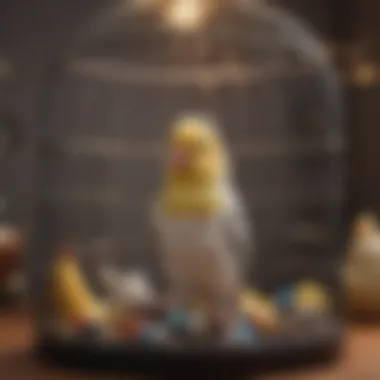
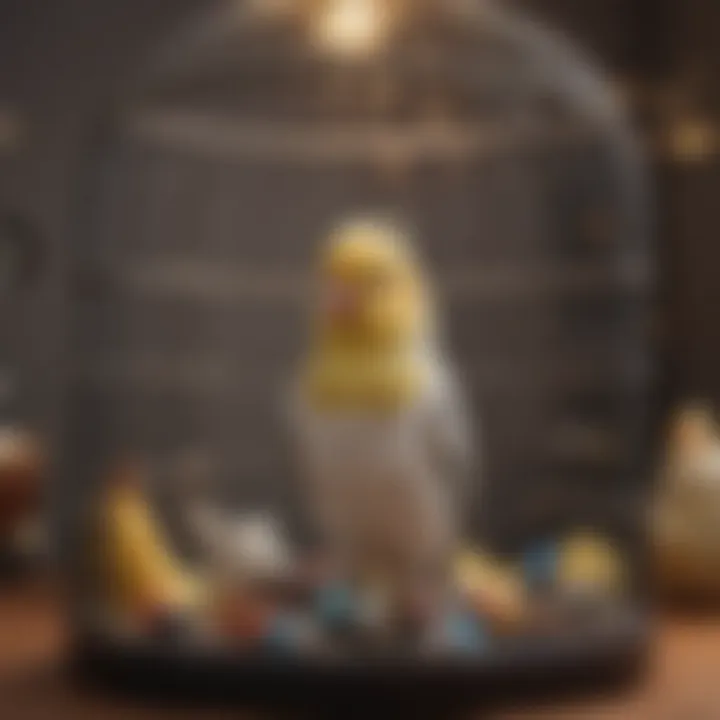
Lastly, consider a cockatiel's they also thrive mentally. Enrich their environment and keep them engaged through various activities.
Enriching Acivities
An enriched life benefits ina trivid every bird.
Toys and Playtime Ideas
Offer them a selection of toys to chew and climb. Change them out to keep interesr, thus preventing boredom. Wiggle in and hiding spaces can bring them joy
Training and Tricks
Training them prompts bonding. Simple commands like “step up” can help them learn and engage more closely with you.
Outdoor Activities and Interaction
Supervised outdoor time can boost a cockatiel’s enjoyment. Use specific harnesses to safely let them explore.
DIY Projects for Mental Stimulation
Create new toys simply by using everyday items. Always check that the materials are non-toxic and safe for birds.
In summary, by understanding and meeting essential needs, cockatiel owners can foster better environments. A little care goes a long doen towards happy, satisfied birds.
Basic Overview of Cockatiels
Understanding the basic overview of cockatiels is essential for anyone considering bringing these remarkable birds into their home. Cockatiels exhibit a continual blend of charm, intelligence, and sociability that makes them popular among bird owners. A thorough comprehension of the foundation aspects—history, physical characteristics, and common behaviors—is key for fostering a nurturing environment. This can enhance the experience of caring for a cockatiel, making it easier to meet their requirements.
History and Origin
Cockatiels, native to Australia, belong to the parrot family, known scientifically as Nymphicus hollandicus. They thrive in various environments across Australia's harsh outback, particularly in open forests and scrublands. Carefully observing their population, they have adapted well to life in tree hollows and often exist in flocks.
Their discovery dates back to the late 18th century, primarily in Australia, but their popularity exploded after being introduced to Europe. Early breeders utilized selective breeding, producing several color mutations, making them desired as pets globally. Cockatiels have played an intrinsic role in aviculture, growing not only as pets but also as part of informal social networks among enthusiasts.
Physical Characteristics
Physical characteristics of cockatiels significantly define what makes them unique. Adult cockatiels typically measure between 12 to 14 inches in length, including their distinctive long tail feathers. Their body structure exhibits a robust posture, coupled with a graceful flight profile. Cockatiels possess a thin, curved beak, which is adapted for cracking seeds.
Their colors can vary widely. Generally, body feathers are gray, while splashes of yellow, white, or orange are frequently good indicators of specific mutations. Males usually display brighter colors, particularly on their cheek patches, and exhibit a distinctive yellow crown. This vibrant appearance, combined with highly social nature, accelerates their appeal to prospective owners.
Common Behaviors
Behaviors displayed by cockatiels reveal their playful and friendly disposition. They exhibit a keen sense of curiosity, often keeping owners and observers engaged. Cockatiels are known for their aptitude in learning, including vocal mimicry—some can mimic human speech and whistles. Their whistles often serve not only as entertainment but also as displays of affection and communication.
Moreover, cockatiels embrace social interactions; bored or lonely individuals may display behavioral issues such as excessive screaming or aggression. Frequent social bottom interactions and exposure to human experiences are vital for healthy development.
Understanding Cockatiel Nutrition
Nutrition is a cornerstone of cockatiel well-being. Providing a balanced diet not only sustains their physical health but also enhances their vibrant personalities. Cockatiels require specific nutrients to support their complicated body functions, version of social behaviors, and overall happiness. Understanding essential elements, benefits, and considerations related to cockatiel nutrition is critical. Failing to address dietary needs can lead to health problems, such as obseity and feather issues.
Essential Dietary Components
The diet of a cockatiel should be comprehensive, combining seeds, pellets, fresh produce, and occasional treats. Seeds are often a favorite among birds, but they should not make the whole diet. High-fat seeds can contribute to, after a period of eating mantaining the wrong best nutrion. Pellets offer a more balalnced mix of nutrients.
Key components of cockatiel food include:
- Protein: Necessary for muscle development and repair. Good sources include cooked legumes, eggs, or specialized pellet offerings.
- Fats: Needed for brain development and energy. Keep fants to a moderate although treating can help wild behavior.
- Carbohydrates: Essential for energy.
- Vitamins and Minerals: Vitamin A, calcium, and more from fresh greens and fruits.
Common Nutritional Deficiencies
Without careful diet planning, cockatiels can suffer from several nutritional deficiencies. Lacking varied fruits and vegitables can lead to serious problems.
Common issues are:
- Vitamin A Deficiency: Causes respiratory and skin areas to not heal correctly.
- Calcium Deficiency: This can affect actions, bones, and egg-laying in females.
- Protein Deficiency: Leads to weakened feathers and a decrease in power.
Regular evaluation of dietary habits can help counteract these alleged deficits.
Recommended Foods
Selecting the right foods is vital in ensuring a coctail's nutritional needs are met. A variety is more appealing and important. They should include a mix of:
- High-quality pellets like Zupreem or Harrison’s
- Fresh dark leafy greens like kale, spinach, and romaine lettuce
- Fruits such as apples, carrots, bananas; avoid pits and seeds from fruits that contain toxins
- Cooked grains, like brown rice and quinoa without additives
Encouraging a range engages their tasting desires too. Different offerings will keep their regular bad from formation to a better actablility.
Foods to Avoid
Certain foods can be hazardous. Making informed decisions about dietary offerings avoids long-term problems. The most harmful foods include:
- Avocado: Contains toxic substances harmful to pets.
- Chocolate and Coffeine: Should be strictly excluded.
- Alcohol: Even a small amount can be lethal.
- Cabbage: Can cause issues almost uncervoons most adepotential.
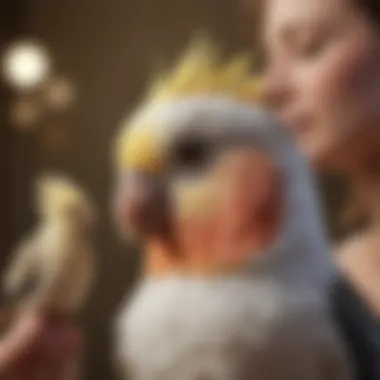
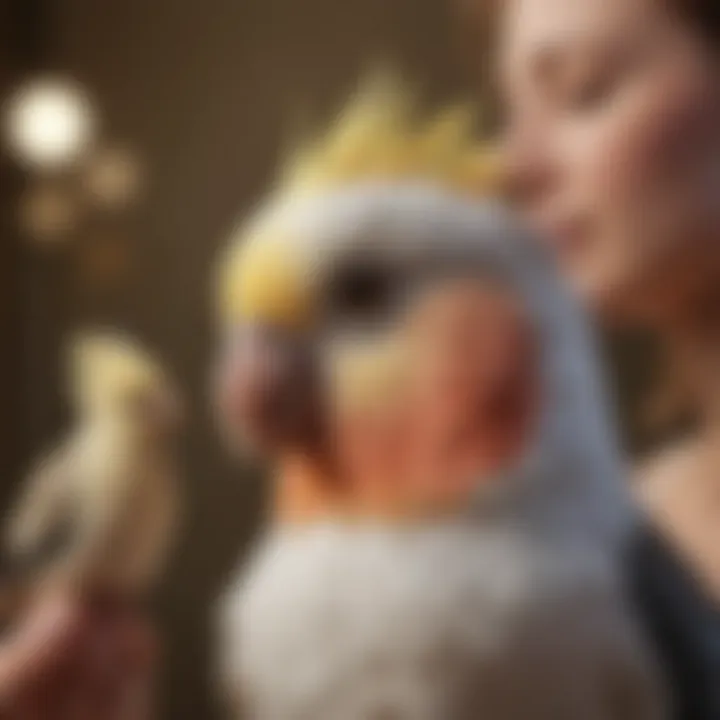
Therefore, owners must be vigilant. Nutritional missteps can lead to longer term health issues.
Environmental Needs
Understanding the environmental needs of cockatiels is fundamental in establishing a secure and healthful atmosphere where they can thrive. The physical surroundings for cockatiels must be carefully considered as environmental factors greatly influence their behavior, health, and overall well-being. Without appropriate spaces and setups, they may feel stressed or uncomfortable, which can lead to various health issues. Owners should prioritize creating environments that cater to the specific requirements of these birds, ensuring their comfort and happiness.
Cage Size and Setup
The cage serves as the primary living space for cockatiels, so selecting the right size and setup is critical. Cockatiels are active birds, known for their playful nature, so their cages should offer adequate room for movement, as well as engaging setups that encourage activity.
A suitable cage size for a single cockatiel would typically measure at least 24 inches wide, 24 inches deep, and 36 inches high. A larger space encourages flight and reduces stress. The interior should have horizontal bars, ideally creating space for climbing and perching. Cockatiels also enjoy various levels to explore.
Inside the cage, it's beneficial to include different types of perches. Using varied diameters and materials promotes foot health. For enrichment, adding toys, such as bell and chew toys, ensures that they remain mentally engaged and physically stimulated. Regular reorganization of objects within their space increases curiosity.
Indoor Space Requirements
Besides the cage, indoor space is critical. Cockatiels need an area where they can safely roam outside of their cages, which helps mitigate boredom and stimulates socialization. Designating a safe zone in every room is crucial. This zone should be free of hazards such as open water, enthusiastically excited dogs, or any possible escape routes to the outside.
It's encouraged to synchronize time outside the cage with several elements:
- Regular Supervision: Ensure that the bird is always watched while outside.
- Bird-friendly Furniture: Consider adjusting the space with few plants or ceramics for unexpected landings.
- Flight Space: Allocate space where they can soar freely, as extended flying helps maintain physical health.
Having space set up in a predictable manner allows your cockatiel to higly understand their environment, which creates a sense of comfort and security.
Temperature and Humidity
The climate of the environment has a huge impact on the overall health of cockatiels. They prefer temperatures between 65°F to 80°F (18°C to 27°C). Extremes in cold or heat can cause health issues. Their environment must be stable, so avoid places close to heating vents, air conditioners, or drafty doors and windows.
Also, humidity levels usually must be between 40 to 60 percent to keep their respiratory system functioning optimally. It's vital to grab a hygrometer or any tool to check surround humidity; dehydrated air can lead to skin problems and overall fatigue in birds.
If humidity drops due to heating, using a humidifier might help. Meanwhile, maintaining good airflow but not direct wind is essential. Cockatiels appreciate fresh air, but breezy conditions can stress their bodies.
Maintaining appropriate environmental conditions not only increases wellness and longevity but supports vibrant behaviors during sucking times like communication, flight, and interaction with their surroundings.
Socialization Needs
Socialization is crucial to a cockatiel's overall happiness and well-being. More than just pets, these birds thrive on interactions, as they are inherently social creatures. Engaging in social behaviors enhances their temperament and contributes to stronger bonds with their owners. A cockatiel that experiences positive socialization is often affectionate, well-adjusted, and less prone to behavioral issues.
Importance of Social Interaction
Understanding how social interaction impacts a cockatiel is vital. These birds are known for their vocalizations and expressions, which often signify their emotional states. They require consistent interaction daily. This can be achieved through talking, playing, or simply being present. Without sufficient interaction, cockatiels may develop anxiety or depression.
The emotional benefits of socialization can include:
- Reduced stress levels
- Increased happiness and playfulness
- Better overall health
Neglecting social interaction can cause long-term behavioral challenges such as excessive screeching or feather plucking. Owners should learn their bird's unique social cues to create a positive home environment. Cockatiels should not be viewed merely as animals in a cage, but as active participants in the household.
Bonding with Your Cockatiel
Building a bond with a cockatiel requires patience and consistency. When a bird feels secure, it is more likely to engage with its owner. Start bonding through positive reinforcement — offer treats when the bird approaches. Consistent routines can also help establish trust.
- Understand individual personality traits; some cockatiels may be shy, while others are more extroverted.
- Spend quiet time nearby even when interactions focus on gentle touches or simply talking.
Establishing a bond can also enable owners to observe their bird's behavior closely, making it easier to identify changes in mood or health. This connection serves as a powerful tool for future handling and care.
Choosing Companions
Socialization often raises the question of companionship. Cockatiels may benefit from having a bird buddy. However, the choice of companion is crucial. Introducing a second bird can significantly influence the primary bird’s behavior, but it can jajsturi iqsthlcle too. Seedsz birngh sthouldnuc noyjo dsbs'dsd o d'shefede saurother𝐹l nuance surround their interaction.
- Species Compatibility: If choosing another bird, ensure they are friendly and can coexist peacefully.
- Gender Considerations: Same-gender pairings may reduce breeding behaviors and potential conflicts.
- Monitor behavior closely during introductions; initially separate cages may assist in adjustment.
Grooming and Care
Grooming and care are essential aspects of cockatiel ownership. By maintaining proper grooming routines, owners can ensure that their birds are healthy and vibrant. Grooming serves not only to keep the cockatiel physically appealing but also enhances its overall well-being. A clean and well-cared-for bird is less likely to suffer from health complications and displays improved behavior. Moreover, grooming is a bonding opportunity for bird owners to interact closely with their cockatiels, thereby fostering trust and connection between them.
Feather Care and Molting
Feather care is crucial for cockatiels, who rely on their plumage for insulation and flight. Regular inspection of the feathers helps in spotting any problems early, such as dirt, matting, or signs of parasites. During the molting season, which typically occurs twice a year, owners may notice an increase in feather shedding. This process can be stressful for the bird. Making sure that the cockatiel has a nutritionally balanced diet rich in vitamins can significantly aid in healthy feather development. Also, providing opportunities for bathing can facilitate the molting process, keeping feathers in optimal condition.
• Allow your cockatiel access to shallow water for safe bathing.
• Use a spray bottle for fine mist baths, as many cockatiels enjoy preening themselves in the water.
Nail Trimming and Beak Care
Regular nail trimming is a necessary part of grooming that seems daunting for many owners. Overgrown nails can lead to discomfort and can sometimes cause injuries. Ideally, nails should be trimmed every few weeks. Using specialized nail clippers or even a concrete perch for natural wearing can help manage this. Many bird owners choose to have a professional do this, particularly if they feel unsure about doing it themselves.
Beak care is also essential. A healthy beak should feel smooth and appear evenly aligned. Occasionally, cockatiels may require beak maintenance or trimming, especially if they develop overgrowth due to dietary deficiencies. Providing appropriate chew toys can help keep the beak healthy as they wear down naturally during play.
Regular care maintains your cockatiel’s comfort and well-being. Ignoring grooming needs can lead to numerous potential health issues.
Bathing and Hygiene
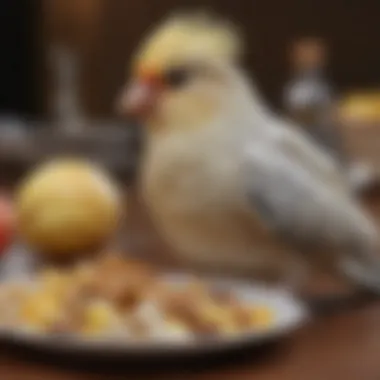
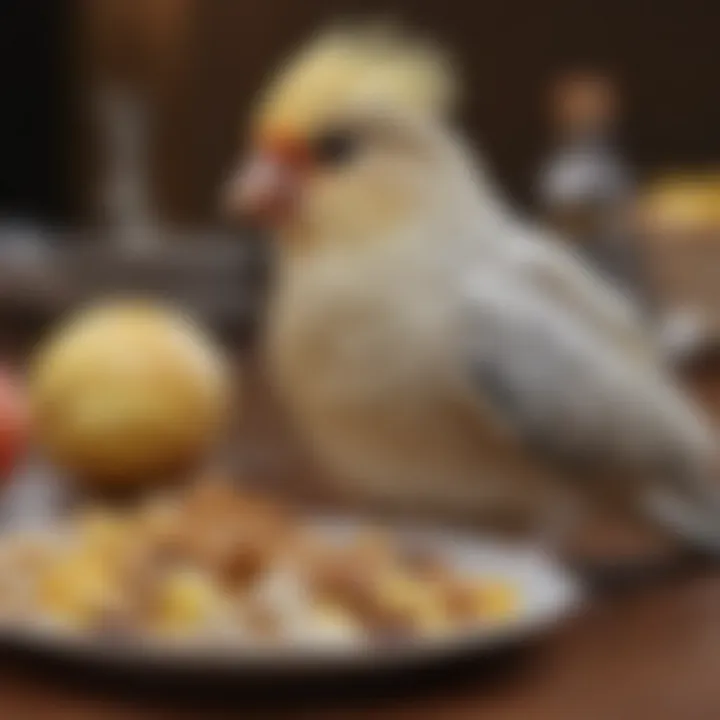
Bathing is vital for young or adult cockatiels. This process helps in maintaining feather condition and supports the bird's overall hygiene. Bathing frequency will depend on individual preferences; some cockatiels enjoy water play more than others. It is essential to use clean, lukewarm water to prevent any thermal shock. Make bath time a positive experience to nurture the bird's comfort level with the process.
Additionally, monitoring the cleanliness of their living space is crucial for health. Regular cleaning of cages and changing out bedding and food ensures a low-stress environment.
To summarize,
- Ensure feather care routines are consistent and attentive.
- Trim nails every few weeks to maintain comfort.
- Facilitate bathing and cleanliness to support overall hygiene.
Acknowledging and meeting these grooming needs contributes significantly to the happiness and health of your cockatiel.
Mental Stimulation and Enrichment
Mental stimulation is vital for cockatiels. These birds are intelligent creatures capable of complex behaviors. Without appropriate enrichment, they can succumb to boredom, leading to negative mental health and behavioral issues. An engaged cockatiel is generally healthier and happier.
Toys and Playtime
Toys are essential for keeping your cockatiel's mind active. There are various types of toys suitable for cockatiels, including chew toys, climbing structures, and puzzle toys. Each type fosters different kinds of interaction.
- Chew Toys: These help to satisfy a cockatiel's natural instinct to chew. They promote beak health and keep birds entertained.
- Climbing Structures: These allow cockatiels to practice their climbing skills. Interaction with these toys replicates their natural behavior and patterns.
- Puzzle Toys: These toys encourage problem-solving, providing both entertainment and a way to stimulate cognitive function.
Spending time each day playing with your cockatiel also fosters bonds. Observing its play style gives insights into the bird’s preferences, enabling you to select toys that keep it engaged.
Training and Challenges
Training is another facet of mental enrichment. Cockatiels respond well to positive reinforcement techniques. They thrive on learning new tricks or commands, boosting both confidence and capability.
Common tricks include:
- Step Up: A basic and essential command that encourages interaction and handling.
- Phrases or Sounds: Teaching your cockatiel to mimic sounds or words can be a delightful challenge.
Challenges during training can help to develop the bird’s analytical skills. Providing consistent structure, with variations in exercises makes training both fun and stimulating for your aviary companion. Clearly, engaging in training has noteworthy morale and behavioral outcomes.
Social Activities
Social interaction is significant for cockatiels, just as stimulation is. They are naturally social birds, and spending time with their owners fulfills their need for companionship. Setting up regular playdates with other birds can provide additional engagements as well.
To enhance social activities:
- Structured Interaction: Allocate daily playtime outside the cage, whether teaching new tricks or engaging with toys.
- Group Play: For those with more than one bird, ensure they play together under safe supervision.
- Response to Sounds: Encourage responses to human voices or other bird calls, creating interaction that engages their social skills.
Cockatiels thrive in environments where they can interact with their owners or fellow birds. Such opportunities reduce feelings of loneliness and stress, contributing positively to their overall well-being.
Remember: Boredom in cockatiels is detrimental. Engage them with various activities that stimulate their minds and fulfill their social needs.
Health and Wellness
Health and wellness are fundamental aspects of cockatiel care, impacting their overall quality of life. A well-maintained cockatiel is not only more vibrant but also less prone to diseases. Regular check-ups and attention to a cockatiel's wellness needs ensure a longer, happier life. This section explores the specifics of maintaining health and wellness through veterinary care, recognizing illness signs, and implementing preventive measures.
Regular Veterinary Care
Regular veterinary care is crucial for maintaining the health of cockatiels. Scheduling annual check-ups allows for early detection of health issues. A bird is often good at hiding health problems, making regular visits with an avian veterinarian essential. During these visits, the veterinarian can assess your cockatiel's health by examining the feather quality, weight, and overall behavior.
Some necessary tests may include:
- Blood tests
- Fecal exams
- Beak and nail trimming
Cockatiels require vaccinations, similar to dogs and cats. Be sure to discuss the appropriate age and recurrence for these shots with your vet to safeguard against common avian diseases. During discussions, listen to the vet's recommendations for diet and enrichment.
Recognizing Illness Signs
Recognizing signs of illness in cockatiels is vital for timely intervention. Changes in behavior may indicate underlying issues. Key signs include:
- Changes in appetite: If your cockatiel suddenly stops eating or drinks less water, pay attention.
- Abnormal droppings: Monitor the consistency and color, as these can be indicators of health problems.
- Lethargy: If your cockatiel is more sluggish or less active than usual, it can be a sign of illness.
- Feather issues: Patches of feathers missing, or excessive plucking can reflect health or emotional problems.
- Changes in vocalization: Increased vocalization, or a sudden decrease in chirping, can denote stress or discomfort.
Regular monitoring of these behaviors enables early intervention and increases the likelihood of successful treatment.
Preventive Health Measures
Preventive health measures lay the foundation for a cockatiel's long-term well-being. Beyond regular vet check-ups, there are several practices to maintain health:
- Balanced diet: Ensure your cockatiel has a varied diet, incorporating seeds, pellets, fruits, and vegetables.
- Hydration: Always provide fresh, clean water daily.
- Safe environment: Avoid exposing your cockatiel to toxic plants or harmful chemicals. Limiting their stress through stable conditions contributes to overall wellness.
- Exercise: Allow opportunities for flight and playtime. Cockatiels need physical activity for mental and psychological stimulation.
Summary and The End
In the care of cockatiels, understanding their essential needs is crucial for fostering a healthy and happy life. This article highlighted several vital aspects, including their needs for nutrition, socialization, grooming, mental stimulation, and health maintenance. Each factor is interconnected, meaning neglecting one can adversely affect another, enhancing the overall complexity of their care. By adhering to guidelines, sheltering your birds is not merely a hobby but fosters genuine relationships anchored in mutual respect and emotional ties.
Recap of Key Needs
Cockatiels thrive under specific conditions catered to their physical and emotional well-being:
- Diet: Offer a balanced diet with seeds, pellets, and fresh fruits or vegetables. These are fundamental for maintaining their energy and vitality. Rare deficiencies can lead to several health complications.
- Environment: A spacious cage and safe allowable area for socialization and exercise is needed. A clean habitat impacts overall health so regular maintenance is key.
- Social Interaction: Cockatiels are social creatures avoiding isolation. Interactions with humans or other birds enrich their mental health, simplifying bonding.
- Grooming: Regular grooming fosters better feather condition and reduces stress related to ill-maintained plumage.
- Mental Stimulation: Toys, varied routines, and challenges keep their environment engaging, enhancing their dexterity and cognitive functions.
Future Considerations
While current measures are likely effective, future considerations are important for continuous improvement in the care of cockatiels:
- Adaptation of Care: Monitor changes in behavior regularly. Cockatiels might outgrow certain environments or routines, signaling the need for changes in care.
- Health Care Trends: Staying updated on advancements in bird food and health care strategies promotes proactive health management.
- Enrichment Variability: Keep routine changes frequent, this allows selecting and discarding enrichment activities that optimize cognitive stimulation and well-being.
- Territorial Needs: If expanding into multi-bird households, recognize and respect individual territorial demands which must be balanced to avoid aggressive interactions.
- Community Insights: Engaging with communities on platforms like Reddit or Facebook provides opportunities for sharing experiences and acquiring collective knowledge on best practices.
With due diligence and understanding of these components, the bond between caregivers and their cockatiels deepens, contributing to their longevity and happiness.















